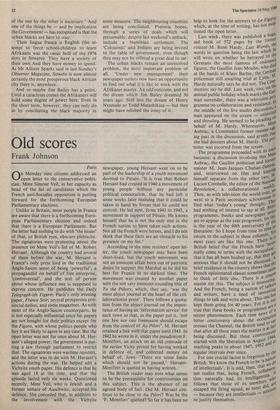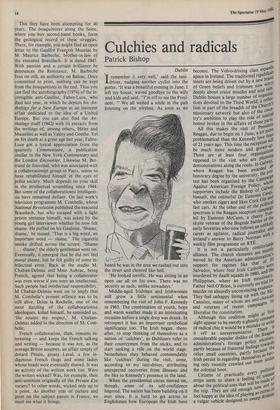Old scores
Frank Johnson
Paris On Monday nine citizens addressed an open letter to the conservative politi- cian, Mme Simone Veil, in her capacity as head of the list of candidates which the French anti-Socialist opposition is putting forward for the forthcoming European Parliamentary elections.
Unlike in Britain, most people in France are aware that there is a forthcoming Euro- pean Parliamentary election and indeed that there is a European Parliament. But the letter had nothing to do with 'the issues' of that, to British eyes, obscure plebiscite. The signatories were protesting about the presence on Mme Veil's list of M. Robert Hersant. Although the country had several of them before the war, M. Hersant is France's only press lord in the traditional Anglo-Saxon sense of being 'powerful', a propagandist on behalf of free enterprise, `controversial', and the sort of person about whose influence one is supposed to express concern. He publishes the Daily Telegraph-ish Figaro; Paris's only evening paper, France Soir; several prosperous pro- vincial dailies, and some magazines. As with most of the Anglo-Saxon counterparts, he is not especially influential since his papers are not bought for their politics except for the Figaro, with whose politics people who buy it are likely to agree in any case. But the open letter was not for once about M. Her- sant's alleged power: the government is put- ting a law through parliament to restrict that. The signatories were wartime resisters, and the letter was to do with M. Hersant's actions during the war. He helped edit a Vichyite youth paper. His defence is that he was aged 18 at the time, and that the episode lasted only six weeks. Questioned recently, Mme Veil, who is Jewish and a former inmate of Auschwitz, accepted his defence. She conceded that, in addition to the involvement with the Vichyite
newspaper, young Hersant went on to be part of the leadership of a youth movement devoted to Petain. 'It is true that Robert Hersant had created in 1940 a movement of young people without any particular political connotation, that he had left it some weeks later realising that it could be taken in hand by forces that he could not control. He led next, from 1941 to 1943, a movement in support of Petain. He knows himself that he is not the only one in the French nation to have taken such actions. Not all the French were heroes, and I do not think that these facts are an obstacle to his presence on my list.'
According to the nine resisters' open let- ter, the youth newspaper may have been short-lived, but the youth movement was not an innocent affair born out of patriotic desire to support the Marshal as he did his best for France in its darkest time. The movement was created by another paper with the not very innocent-sounding title of To the Pillory, which, they say, 'was the most abject journal at the heart of the col- laborationist press'. There follows a quota- tion from the abject journal on the impor- tance of having an 'information service' for each town so that, as the paper put it, 'not one Jew nor one freemason should escape from the control of Au Pilori'. M. Hersant retained a link with that paper until 1943. In 1942 he wrote in it, under the pseudonym F. Montfort, an attack on an old comrade of the earlier Vichy period for having worked in defence of, and collected money on behalf of, Jews. 'There are some limits which should not be passed,' Hersant- Montfort is quoted as having written.
The British reader may note what seems to be the prerequisite for controversies on this subject. This is the absence of an agreed body of fact. Did M. Hersant con- tinue to be close to Au Pilori? Was he the `F. Montfort' quoted? So far it has been no The Spectator 19 MaY 190 help to look for the answers to Le Figar4 which, at the time of writing, has not met` tioned the open letter. Last week, there was published a huge' sad book of 572 pages by the former resister M. Rene Hardy, Last Words, the words in question being the last which he will write on whether he betrayed to the Germans the most famous of resistance figures, the Gaullist Jean Moulin, who died at the hands of Klaus Barbie, the Gering policeman still awaiting trial at Lyon. m Hardy naturally says he did not. The CO" munists say he did. Last week, too, on the annual public holiday which marks the Ger- man surrender, there was a television pr°- gramme on collaboration and resistance.° the middle of the live studio discussioma man appeared on the screen — uninvited and shouting. He seemed to be pleading on behalf of M. Hardy. Whereupon, Aubrac, a Communist former resister Ex..; ing part in the discussion, said griMlY that she had dossiers about M. Hardy. The Pr'„t.
'tester was escorted from the screen. .„
The programme proceeded with its mai; business: a discussion involving this Mm Aubrac, the Gaullist politician and former resister M. Jean-Jacques Chaban-Delmar' and, interviewed on film and keePITY himself separate from the other tw°, Lucien Combelle, the editor of the Islait'w- Revolution, a collaborationist wee',e. Then, as with television the world over, t went to a Paris secondary schoolroom find what `today's young' thought. There) had nothing of interest to say at all. h4°.es programmes, books and newspaper setfhlis are to appear as the year progresses, fc/re `the is the year of the 40th anniversary °' the liberation. So I hope from time to tune et return to the subject in these columns', a most years are like this one. The ts ever British belief that the French have ‘11ev, really come to terms with the occuPart°t., -; that it has all been hushed up, that they anxious that it should not be discussed' tile brief residence in the country shows that try, French opinionated classes sometimes see'ie to think of little else. There is a stIP.,,Pg. reason for this. The subject is insert And the French, being a nation of talk.`ng and writers, have a need of interestht as things to talk and write about. This one sof kept them going for 40 years. For it i5 re a ° true that these books or programmes a`f g recent phenomenon. Each time news dor] bitter controversy about the occuPa0, crosses the Channel, the British tend t°150 that after all these years the matter is at tes being discussed. But these controverso, started with the liberation in August I9d at reaching peaks in about 1947, 1952 an regular intervals ever since. the one crucial factor is forgotten bY .00 British. We know the French to be 'a nano of intellectuals'. It is odd, then, that we_ not realise that, being French, conaholt tion naturally had its intelligentsia;ho follows that those of its membects, are escaped the firing squad, as most clwj,.005 — because they are intellectuals —
to justify themselves.
This they have been attempting for 40 years. The bouquinistes along the Seine, where you buy second-hand books, form the geological record of these struggles. There, for example, you might find an open letter to the Gaullist Franiois Mauriac by M. Maurice Barbeche, brother-in-law of the executed Brassilach. It is dated 1947. With passion and a certain brilliance he denounces the Resistance. M. Barbeche lives on still, an authority on Balzac. Once committed to print, nothing can be kept from the bouquinistes in the end. Thus you can find the autobiography (1974) of the in- corrigible anti-Gaullist, Fabre-Luce, who died last year, in which he depicts his An- thology for a New Europe as an innocent affair dedicated to the idea of a United Europe. But you can also find the An- thology itself (1942) with its extracts from the writings of, among others, Hitler and Mussolini as well as Valery and Goethe. Yet on his death at a great age last year, Fabre- Luce got a lyrical appreciation from the quarterly Commentaire, a publication similar to the New York Commentary and the London Encounter. Likewise M. Ber- trand de Jouvenal, who was associated with a collaborationist group in Paris, seems to have rehabilitated himself in the eyes of polite society. Much depends on your skill in the intellectual scrambling since 1944. But some of the collaborationist intelligent- sia have remained defiant. On last week's television programme M. Combelle, whose National Revolution published the executed Brassilach, but who escaped with a light prison sentence himself, was asked by the young girl interviewer whether he now felt shame. He puffed on his Gauloise. 'Shame, shame,' he mused. 'That is a big word, an important word — shame.' The cigarette smoke drifted across the screen. 'Shame ... shame,' the elderly gentleman went on. Eventually, it emerged that he did not feel moral shame, but he felt guilty of some in- tellectual error. Back in the studio M. Chaban-Delmas and Mme Aubrac, being French, agreed that being a collaborator was even worse if you were an intellectual. Such people had intellectual responsibility. M Chaban-Delmas went on to imply that M. Combelle's present offence was to be still alive. Drieu la Rochelle, one of the most dazzling of the collaborationist ideologues, killed himself, he reminded us. `He retains my respect,' M. Chaban- Delmas added in the direction of M. Corn- belle.
French collaboration, then, remains in- teresting — and keeps the French talking and writing — because it was not, as the average Briton assumes, an affair simply of dotard Petain, greasy Laval, a few in- digenous French thugs and some ladies whose heads were eventually shaved. It was an activity of the written work too. Were the writers wicked? Was, for example, their anti-semitism originally of the Private Eye variety? In other words, wicked only up to a point. As another year of picture and print on the subject passes in France, we must see what it brings.















































 Previous page
Previous page